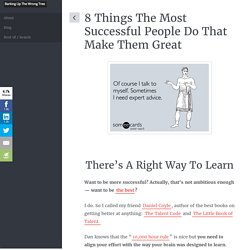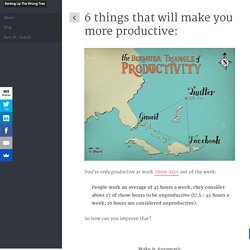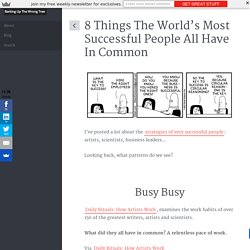

Be Unstoppable: The 8 Essential Actions to Succeed at Anything eBook: Alden Mills: Kindle Store. How To Stop Being Lazy And Get More Done - 5 Expert Tips. Before we commence with the festivities, I wanted to thank everyone for helping my first book become a Wall Street Journal bestseller. To check it out, click here. Some days the to-do list seems bottomless. Just looking at it is exhausting. We all want to know how to stop being lazy and get more done. I certainly want the answer. So I decided to call a friend who manages to do this — and more. Cal Newport impresses the heck out of me. He has a full-time job as a professor at Georgetown University, teaching classes and meeting with students.He writes 6 (or more) peer-reviewed academic journal papers per year.He’s the author of 4 books including the wonderful “So Good They Can’t Ignore You.”
And yet he finishes work at 5:30PM every day and rarely works weekends. No, he does not have superpowers or a staff of 15. 4 Lifehacks From Ancient Philosophers That Will Make You Happier. Lessons From The Samurai: The Secret To Always Being At Your Best. What are the secrets to making better decisions? The Simple Thing That Makes The Happiest People In The World So Happy. What's the most effective way to change your behavior and improve your life? 8 Things The Most Successful People Do That Make Them Great. There’s A Right Way To Learn Want to be more successful?

Actually, that’s not ambitious enough — want to be the best? I do. So I called my friend Daniel Coyle, author of the best books on getting better at anything: The Talent Code and The Little Book of Talent. Dan knows that the “10,000 hour rule” is nice but you need to align your effort with the way your brain was designed to learn.
3 Ways Elephants And Neuroscience Can Help You Make Better Decisions. Everything You Know About Neuroscience is Wrong Here’s a fancy brain picture for you: Research says that’s likely to make you think I know what I’m talking about — even if I don’t.

Via The Invisible Gorilla: How Our Intuitions Deceive Us: In one clever experiment, David McCabe and Alan Castel had subjects read one of two descriptions of a fictitious research study. The text was identical, but one description was accompanied by a typical three-dimensional brain image with activated areas drawn in color, while the other included only an ordinary bar graph of the same data. The brain is quite complex and poorly understood — even by experts. As Molly Crockett explains, most everything we read in the media about the brain is grossly oversimplified and often flat-out wrong. Oxytocin isn’t just the “love hormone.” 3 Ways Elephants And Neuroscience Can Help You Make Better Decisions.
The System That All Creative Geniuses Use To Develop Their Ideas. What can make you happier, increase your attention span and even make you more courageous? The Two Words That Will Lead You To Success And Happiness. What does it take to become an expert at anything? 6 things that will make you more productive: You’re only productive at work three days out of the week: People work an average of 45 hours a week; they consider about 17 of those hours to be unproductive (U.S.: 45 hours a week; 16 hours are considered unproductive).

So how can you improve that? Make It Automatic The secret to getting more done is to make things automatic. Decisons exhaust you: The counterintuitive secret to getting things done is to make them more automatic, so they require less energy. It turns out we each have one reservoir of will and discipline, and it gets progressively depleted by any act of conscious self-regulation. You need to break bad habits and develop solid routines. The things that effect our behavior perhaps more than anything else is context: Manipulate your environment so as to make what you should do easy and what you shouldn’t do hard. First step? A morning routine can be really good.
Get your head right Mood matters. Proven methods for increasing happiness are here. Stop Multitasking Use checklists. Rest. Can one word sum up everything you need to do to be happier? 26 Top Time Management Hacks: 8 Things The World's Most Successful People All Have In Common. I’ve posted a lot about the strategies of very successful people: artists, scientists, business leaders… Looking back, what patterns do we see?

Busy Busy Daily Rituals: How Artists Work, examines the work habits of over 150 of the greatest writers, artists and scientists. What did they all have in common? A relentless pace of work. Via Daily Rituals: How Artists Work “Sooner or later,” Pritchett writes, “the great men turn out to be all alike. What did Stanford professor Jeffrey Pfeffer find when he looked at high achievers like LBJ and Robert Moses? 60-65 hour work weeks were not uncommon.
Via Managing With Power: Politics and Influence in Organizations: In a study of general managers in industry, John Kotter reported that many of them worked 60 to 65 hours per week–which translates into at least six 10-hour days. When Mihaly Csikszentmihalyi studied geniuses for his book Creativity, he realized something fascinating about IQ. (More on the work habits of geniuses here.) Just Say No Build Networks. How To Get Happy RIGHT NOW: 7 Quick Ways To Feel Better.